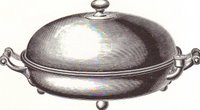 Today, April 17th …
Today, April 17th …Eliza Acton was born on this day in 1799 in Sussex. She was a frustrated unsuccessful poet, but an instantly and enduringly successful cookbook writer – and the first one to list the ingredients separately from the method. Her “Modern Cookery for Private Families”, published in 1845, was intended for the home cook, and became an enormously popular book until it was ousted by Mrs Beetons “Household Manual” (which contains many recipes sourced from Mrs Acton). It remains a much finer book than Isabella’s.
The book is liberally sprinkled with pithy comments, firm opinions, and general “observations” on all topics: fish should be cleaned with “scrupulous nicety”, cream for a trifle should be heated in a “delicately clean” saucepan; cakes are “sweet poison”, and garlic should be boiled in several changes of water to reduce its “naturally pungent flavour and smell”.
Eliza also credits her recipe sources (often suggesting improvements), and is very clear on gender roles:
“ … a gentlewoman should always, for her own sake, be able to carve well and easily, the dishes that are place before her that she may be competent to do the honours of a table at any time with propriety and self-possession.”
“When partridges are served to ladies only, or in parties where they are present, it is now customary to take off the heads, to truss the legs short, and to make them appear (in poulterer’s phrase) all breast.” The partridges, of course should “hang as long as they can possibly be kept without becoming offensive”.
Now, you dont get advice like that from Nigella and Jamie, do you?
In the hey-day of British colonialism, she has a chapter on curries.
Mr. Arnott’s Currie-Powder.
Turmeric, 8 oz.*, coriander seed, 4 ox., cummin seed, 2 oz., fenugreek seed, 2 oz., cayenne, ½ oz. (more or less of this last to the taste.)
Let the seeds be of the finest quality. Dry them well, pound, and sift them separately through a lawn sieve, then weigh, and mix them in the above proportions. This is an exceedingly agreeable and aromatic powder, when all the ingredients are perfectly fresh and good, but the preparing is rather troublesome.
*We think it would be an improvement to diminish by two ounces the proportion of turmeric, and to increase that of the coriander seed, but we have not tried it.
Mr. Arnott’s currie recipe follows, with Eliza’s suggested improvements.
Tomorrow: A Feast of Reason and a Flow of Soul.
Over and Above ...
This week, in celebration of her birthday, TOF will feature Eliza's recipes.
Eliza Acton's book also contains the first known recipe for Bakewell Pudding. It is here, as are recipes for Mr Arnott's Currie, Bengal Currie, Garlic Ragout, and several others.
Quotation for the Day ...
Food is an implement of magic, and only the most coldhearted rationalist could squeeze the juices of life out of it and make it bland. In a true sense, a cookbook is the best source of psychological advice and the kitchen the first choice of room for a therapy of the world.
Thomas More, in 'The Re-Enchantment of Everyday Life.'
And THAT, my friends, is why the kitchen is the heart of the home!
ReplyDeleteThere are so many good quotations about food and love and cooking and good food as therapy. Lets start a collection?
ReplyDeleteGreat quotation. I came across your blog and I am very glad I did. I go to the University of Adelaide Australia Master's in Gastronomy program. Food history is a fascinating subject and your blog is fantastic.
ReplyDeleteThankyou Tami, it is nice to have another Australian blogger to talk to!
ReplyDeletethat is actually Thomas Moore, double O. But a lovely quotation, thank you.
ReplyDeleteWendy